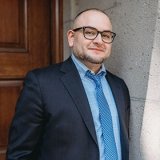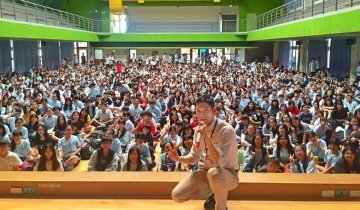On April 1, Associate Professor of Education Adrian Huerta was about to walk into the auditorium and speak to students at Bob Miller Middle School in Las Vegas when he received a call from USC Rossier Dean Pedro Noguera. This is a call he’d been waiting on for 15 years, and despite it being April Fool’s Day, this was no joke. Noguera called to share the news that he had earned tenure.
“I was smiling from ear to ear,” Huerta recalls. He was in a state of disbelief, gratefulness and excitement as he thanked Noguera and dialed his partner to share the news.
What came next was easy: Speaking to a group of Latino middle schoolers about the value of higher education through the story of his own journey. He spoke about the importance of resilience, seeking help when necessary, and taking pride in one's own racial identity while understanding the importance of developing relationships with those who are different from oneself.
He happily shared the news of his tenure achievement with the students, explaining what it meant and all the steps he took to achieve this remarkable milestone.
Academic tenure is one of the most prestigious appointments faculty can obtain. The practice began in the U.S. in the early 1900s as a means of ensuring academic freedom for our nation’s scholars. Huerta also contextualized his achievement for the students by explaining that, despite Los Angeles County having the largest Latino population of any county in the nation—just under 50%—this percentage isn’t reflected in the population of tenured faculty at institutions like USC. Huerta became one of the 85th Latina/o faculty to hold tenure in the 2024-2025 academic year at USC, following his USC Rossier colleague Stephen Aguilar, associate professor of education, who earned tenure in 2024.
Adrian’s achievement of tenure is a well-earned accomplishment and one he has been working toward since a mentor planted the seed in his head when he was an undergrad at the University of Nevada at Las Vegas. He had asked Henry Villanueva, an assistant to the vice chancellor for academic and student affairs at the school, “How do I get a job like you?” And Villanueva explained the pathway to Huerta, which set him off on a journey that would take him to graduate school at The Ohio State University and the UCLA School of Education and Information Studies, where he earned his PhD in 2016.
Along the course of his journey, Huerta was fortunate to have mentors who believed in him. At UCLA, faculty like Patricia McDonough, Cecilia Rios-Aguilar, Walter Allen and Tyrone Howard helped him forge his path in academia. When he arrived at USC Rossier as a postdoc, he found a mentor in University Professor Emeritus and founding director of the USC Rossier Pullias Center for Higher Education, William Tierney. Today, Huerta counts Dean’s Professor of Leadership and current Pullias Center director, Adrianna Kezar, as an important mentor. Huerta looked at the successes of these mentors and thought about how he could “reverse engineer it,” so he too could get to a position where he was not only teaching and influencing future generations but conducting research that has the power to disrupt problematic systems.
After graduating from UCLA, Huerta was hired at the USC Rossier School of Education in 2019, where he teaches in the school’s graduate programs and conducts research. Among his recent accolades are the Anna Julia Cooper Early Career Award from the American Sociological Association in 2024 and from the Association for the Study of Higher Education in 2022. He was also named the recipient of USC Rossier’s own Excellence in Research Award in 2023.
Thus far in his career, Huerta has secured more than $2.8 million in local, state, federal, and philanthropic dollars for projects tied to his research agenda, which focuses on college access and success, boys and men of color, student parents, and active/former gang-involved students across the educational populations.
“Professor Huerta’s achievement of tenure is a well-deserved milestone, and USC Rossier is proud to count him among our faculty,” says Dean Pedro Noguera. “His research has transformed the way we think about access to higher education, broadening our sense of who belongs in these spaces and improving support for all students.”
Huerta’s research has often focused on community colleges. It’s a “primary gateway to higher ed for many students,” Huerta says of community college. It’s a gateway he knows well, as he started his journey in higher education at Santa Barbara City College and then the College of Southern Nevada. Because of this personal experience, he has a heightened sensitivity to what community college students are going through—he knows what it’s like “to work 8-9 hours a day and then go to class till 10:00 at night.”
Reflecting on his contributions to the field, Huerta cites the LBCC Phoenix Scholars program as the project he’s most proud of. Huerta received a $1M grant from the U.S. Department of Education to launch the program with the goal of helping former gang-involved and gang-impacted students succeed and persist through college at Long Beach Community College. Huerta, the architect of the project, wanted to make sure that the Phoenix Scholars program served students holistically—from ensuring the students had professional clothing for jobs and internships to sessions with a social worker to assist students as they processed “emotions related to violence or victimization,” Huerta says.
“The Phoenix Scholars Program and project reflect Adrian’s important and novel approach to scholarship. He deeply embeds himself in practice and with vulnerable communities. Through this project, he works to support justice-impacted individuals to succeed in college, says Adrianna Kezar, director of the Pullias Center.
The program concluded in December 2024, and at its peak, it was assisting over 150 students. Huerta is incredibly proud that the program has continued at LBCC, albeit on a smaller scale due to budget constraints, but it’s an achievement that meets Huerta’s belief in research to practice. “The program is based on his prior research and then iteratively studies ways these practices might be improved to support future students,” Kezar explains. “This praxis (joining research and practice) is impactful and cutting edge in its approach to research.”
Up next for Huerta is a project he’s working on with Daniel Soto at Keck Medicine of USC, where Huerta also has a faculty appointment. The two are looking at gang involvement as a community health issue and investigating interventions other than the traditional route of the criminal justice system for gang-involved youth. The goal of the project, which is in its early stages, is to create professional development sessions that help K–12 educators “rethink the needs of gang-involved youth and their communities,” Huerta says.
Before earning tenure, Huerta felt like he was going 150 miles per hour—submitting numerous research papers and grant applications every month. Now, he feels like he can step back and travel just above the speed limit at 70 miles per hour. He feels he can be “more intentional and breathe.” He also feels he can “be even more creative … and step out of the box to think about problems differently.”
With the “safety and security of tenure,” Huerta now feels it’s okay to pursue projects that could fail in his ultimate pursuit to “translate what I’m doing to create low-cost solutions so that we can transform systems.





